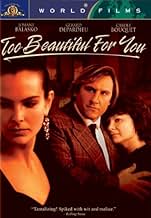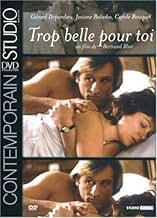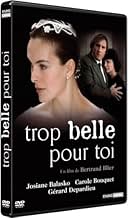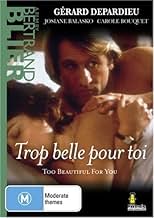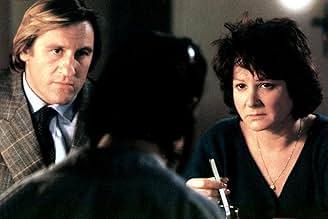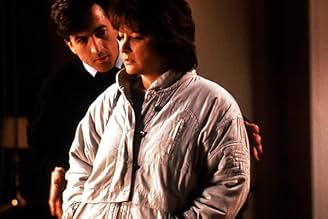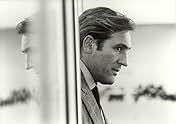IMDb RATING
6.6/10
3.2K
YOUR RATING
A sharp love triangle is formed by a wealthy businessman.A sharp love triangle is formed by a wealthy businessman.A sharp love triangle is formed by a wealthy businessman.
- Awards
- 6 wins & 7 nominations total
Gérard Depardieu
- Bernard Barthélémy
- (as Gerard Depardieu)
Catherine Gillet
- La femme du train
- (uncredited)
Sylvie Orcier
- Marie-Catherine
- (uncredited)
- Director
- Writer
- All cast & crew
- Production, box office & more at IMDbPro
Featured reviews
Bertrand Blier's story of love at first sight between a successful auto salesman and his older, unglamorous secretary does more than simply dispel the skin-deep myth of physical beauty. Gérard Depardieu describes his new lover as "not beautiful, but nice", but his aristocratic young wife dismisses her for being 'common', setting up a conflict not between age and beauty but between opposing social classes, with a proletarian lug who married into the upper crust becoming justifiably mushy over someone less pretentious than his wife. It sounds like fun, but anyone expecting a lightweight romantic farce will be disappointed to find something closer to an intellectual exercise in style, designed around an exaggerated sense of melodrama and several odd, operatic gestures: characters thinking out loud in public or engaging in third-person soliloquies, and so forth. Not to mention, in an obscure ongoing joke, a few outspoken criticisms of the music of Franz Schubert.
Bertrand Blier is the French Pedro Almodovar: cynical and shocking. Either you love, either you hate his movies. Some of them have divided French public due to their shocking contents, notably "Les Valseuses" (1974). "Trop belle pour toi" appears like an exception in his work. It means that taste of Blier for provocation is less pronounced. However, it doesn't make the movie better for all that. It doesn't work for several reasons:
first, it's hard to follow the plot because Blier introduces sequences that are earlier or subsequent to the present scene. For example, we realize too late that Colette ( Balasko) after she left Bernard, married with a man and she had children. The movie ignores certain sequences that are however essential to the development of the plot.
Then, the movie irritates due to its main characters, it goes without saying that dialogs are the key to the good development of the plot. But here, you are under the impression that the characters don't exchange their words. They're talking in the emptiness and don't seem to care about the others' opinion!
Let's add that the movie, sometimes, creates a certain boredom because of some lifeless sequences that drag on (notably during dinners in Depardieu's ravishing house with his wife ( Bouquet) and all their guests.
In short, "trop belle pour toi" is a cold and no soul movie and it left me unsatisfied in spite of good ideas in the making ( Cluzet who expresses his anger with Schubert's music in the background played very loud). Even a trio of outstanding actors don't succeed in saving the movie.
Remark: Carole Bouquet won an Oscar in France in 1990, for her performance in this movie. Good for her.
first, it's hard to follow the plot because Blier introduces sequences that are earlier or subsequent to the present scene. For example, we realize too late that Colette ( Balasko) after she left Bernard, married with a man and she had children. The movie ignores certain sequences that are however essential to the development of the plot.
Then, the movie irritates due to its main characters, it goes without saying that dialogs are the key to the good development of the plot. But here, you are under the impression that the characters don't exchange their words. They're talking in the emptiness and don't seem to care about the others' opinion!
Let's add that the movie, sometimes, creates a certain boredom because of some lifeless sequences that drag on (notably during dinners in Depardieu's ravishing house with his wife ( Bouquet) and all their guests.
In short, "trop belle pour toi" is a cold and no soul movie and it left me unsatisfied in spite of good ideas in the making ( Cluzet who expresses his anger with Schubert's music in the background played very loud). Even a trio of outstanding actors don't succeed in saving the movie.
Remark: Carole Bouquet won an Oscar in France in 1990, for her performance in this movie. Good for her.
The few reviews here indicate that this is a film which provokes in some boredom and confusion, while other will find it provocative and daring in its originality. Maltin gives it a two-star rating and says "after a bright beginning, it goes absolutely nowhere." I was prepared to abandon the film after 15 minutes or so, but the absolutely gorgeous Schubert melodies that pervade the score and tie it all together....they kept me going with the film, and the fantastic photography, acting, and plot twists sustained my interest to the end.
Yes, the approach is surreal and the story-telling non-linear. Much of the dialog is brilliant, but it soon became obvious (to me, anyway) that these people are not actually saying these things to one another ... and what an interesting world it would be if we could say aloud all the things that we deeply feel! I cannot pretend to have understood it all, but the film had an intellectual appeal and, to repeat an earlier point, a ravishing score of Schubert pieces which adorn the film like precious jewels.
Yes, the approach is surreal and the story-telling non-linear. Much of the dialog is brilliant, but it soon became obvious (to me, anyway) that these people are not actually saying these things to one another ... and what an interesting world it would be if we could say aloud all the things that we deeply feel! I cannot pretend to have understood it all, but the film had an intellectual appeal and, to repeat an earlier point, a ravishing score of Schubert pieces which adorn the film like precious jewels.
I saw this film at least twice in the theaters and then again a few years later on DVD and loved it each time. To me, the reason it works so well might also be why some viewers might find it off-putting: much of what is presented on-screen is that of a subjective and unreliable narrator (Gerard Depardieu's character). Thus, scenes will often play out twice; first from the perspective of what he imagines, and then from a (possibly) more factual viewpoint. This applies to the other main characters as well, both his stunning wife and rather average secretary.
Each character in their own way sees themselves at the center of the story, though the film mostly follows the path of Depardieu. We are left to wonder why he'd embark on this affair in the first place, and though I can think of a few plausible answers, it might just be: sometimes people make choices that they themselves could not explain, but they do it anyway. As viewers, we are just there for the ride.
There is also plenty of humor throughout, both poking a little fun at the whole love triangle concept, and a range of upper middle-class conceits in addition. It's by no means a critique or polemic though; it's just that a lot of life really CAN be sort of silly if you take a few steps back. To me, the way the film is told and shot indicates that the director feels empathy for each of the three characters, and no one is entirely hero or villain. At the same time the movie might well be a commentary on the tendency of the way people go running in circles, chasing their own tale in the name of happiness. Either way, it ably straddles both the dramatic and comedic in a manner that French cinema often does better than any other.
Each character in their own way sees themselves at the center of the story, though the film mostly follows the path of Depardieu. We are left to wonder why he'd embark on this affair in the first place, and though I can think of a few plausible answers, it might just be: sometimes people make choices that they themselves could not explain, but they do it anyway. As viewers, we are just there for the ride.
There is also plenty of humor throughout, both poking a little fun at the whole love triangle concept, and a range of upper middle-class conceits in addition. It's by no means a critique or polemic though; it's just that a lot of life really CAN be sort of silly if you take a few steps back. To me, the way the film is told and shot indicates that the director feels empathy for each of the three characters, and no one is entirely hero or villain. At the same time the movie might well be a commentary on the tendency of the way people go running in circles, chasing their own tale in the name of happiness. Either way, it ably straddles both the dramatic and comedic in a manner that French cinema often does better than any other.
I saw "Trop Belle Pour Toi" when it was released on the art-house theatrical circuit in the U.S. 30 years ago. This film has stuck with me since that time and still feels very true to life as our culture has become even more superficial than it was in the "go-go" '80s--particularly when it comes to definitions of beauty. The plot is simple: A rough-edged, ambitious, striving man (Gerard Depardieu at the height of his international fame) has achieved great success in the auto business, and he's acquired all the "trophies" that he may have desired: the cars, the house, the lifestyle, the almost too-gorgeous, elegant, younger wife. But he develops a visceral attraction to his secretary, who is dumpy, older, physically ordinary. They begin an affair, and he finds his lover warm, comforting, engaging and sexually exciting in ways that his very beautiful wife (crisply played by Carole Bouquet) is not.
What stuck with me about this film for 30 years is the deft way the director upends the classic interpretations of what makes someone "attractive," desirable or sexy, and what makes for a really exciting sexual and romantic relationship. The film hits some very true-to-real-life notes about what drives people in their most basic appetites and desires. Depardieu gives an engaging, visceral performance as a man having a classic midlife crisis: he's bored by his marriage to the perfect woman that everyone else envies, even though she's perfectly nice and intelligent. Every time I read or hear people saying that some famous man must be crazy for cheating on his beautiful wife or that he must be blissfully happy because his wife is a famous beauty, I automatically think of this film. I plan to watch it again soon.
What stuck with me about this film for 30 years is the deft way the director upends the classic interpretations of what makes someone "attractive," desirable or sexy, and what makes for a really exciting sexual and romantic relationship. The film hits some very true-to-real-life notes about what drives people in their most basic appetites and desires. Depardieu gives an engaging, visceral performance as a man having a classic midlife crisis: he's bored by his marriage to the perfect woman that everyone else envies, even though she's perfectly nice and intelligent. Every time I read or hear people saying that some famous man must be crazy for cheating on his beautiful wife or that he must be blissfully happy because his wife is a famous beauty, I automatically think of this film. I plan to watch it again soon.
Did you know
- TriviaIn the documentary Blier, Leconte, Tavernier: trois vies de cinéma (2020), Blier says it was hell to shoot.
- Quotes
Colette Chevassu: Beauty hurts.
- SoundtracksImpromptu Opus 90 No 2
Music by Franz Schubert
Piano: Odette Gartenlaub
édition CINE VALSE - D.D. PRODUCTIONS - ORLY FILMS -S.E.D.I.F.
- How long is Too Beautiful for You?Powered by Alexa
Details
Box office
- Gross US & Canada
- $1,776,440
- Opening weekend US & Canada
- $31,208
- Mar 4, 1990
- Gross worldwide
- $1,776,440
- Runtime
- 1h 31m(91 min)
- Sound mix
- Aspect ratio
- 2.35 : 1
Contribute to this page
Suggest an edit or add missing content

